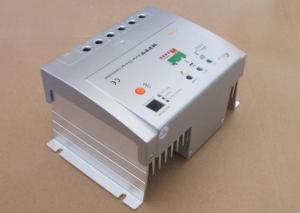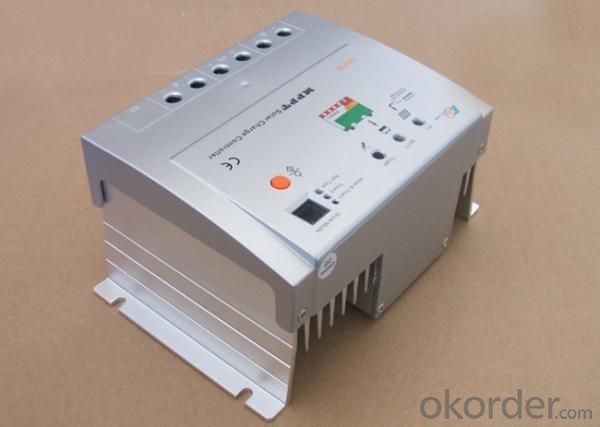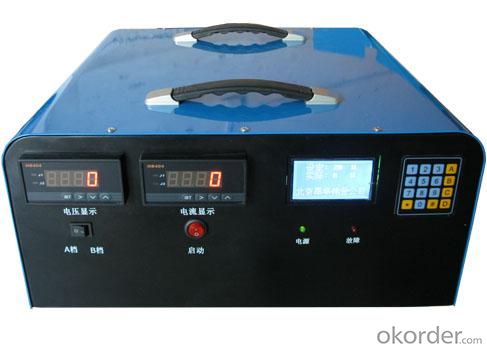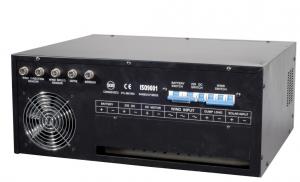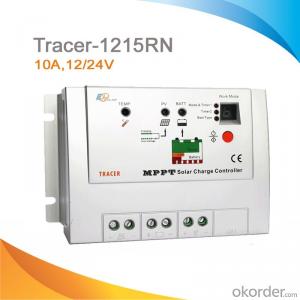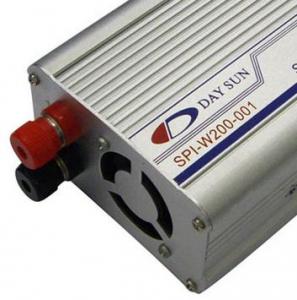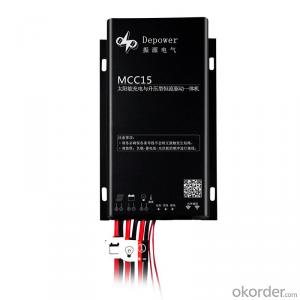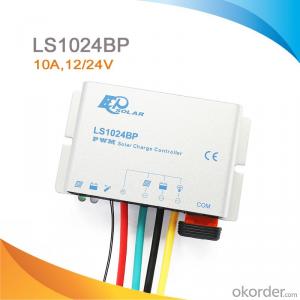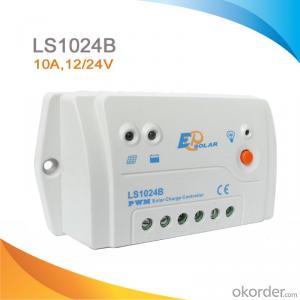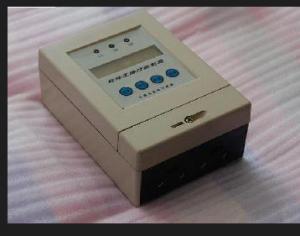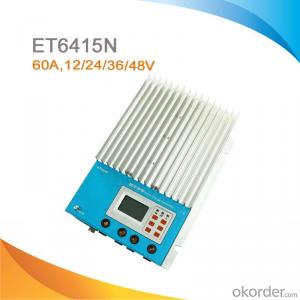High Quality Solar Controller Tracer-1210RN
- Loading Port:
- China Main Port
- Payment Terms:
- TT
- Min Order Qty:
- 1 unit unit
- Supply Capability:
- 10000 unit per month unit/month
OKorder Service Pledge
OKorder Financial Service
You Might Also Like
Introduction of High Quality Solar Controller Tracer-1210RN
Tracer-1210RN solar controller is our new generation controller for off-grid solar system, such as street light, solar home system or small power station etc.Tracer-1210RN has LCD display, reliable battery charging, full electronic protection, programmable parameters and other features and powerful function.
Our factory is highly recognized by its business partners and clients all over the world and has obtained rapid development under the spirit of win-win .With Solar Controller Tracer-1210RN,We will carry on the mutual beneficial,innovative and revolutionary trading structure as we did before,create value for our employees,share holders and clients and benefit the whole society in our future development.Please contact us ,if you have interest in Solar Controller Tracer-1210RN,don’t hesitate!
Features of High Quality Solar Controller Tracer-1210RN
·Adopt graphics dot-matrix LCD screen and HMI (human-machine interface) with 4 buttons, integrated menu displaying and operation
·32 bit MCU with high speed
·12 bit A/D high-precision sampling to ensure accuracy
·Excellent EMC design
·High efficient Series PWM charging
·Use MOSFET as electronic switch
·Widely used, automatically recognize day/night
·Humanized design of browser interface, undertake every operating conveniently
·Full control parameters setting and modification, diversified load control mode
·Gel, Sealed and Flooded battery type option
·Adopt temperature compensation, correction algorithm for charging and discharging parameters automatically
Electronic Protections of High Quality Solar Controller Tracer-1210RN
·Overheating
·Over discharging
·Over charging
·Load overload
·Load short circuit
·PV reverse polarity
·Battery reverse polarity
Data Sheet of High Quality Solar Controller Tracer-1210RN | |
Model | Tracer-1210RN |
Rated system voltage | 12/24V auto work |
Rated battery current | 10A |
Rated load current | 10A |
Max.battery voltage | 32V |
Max.PV open circuit voltage | 100VDC |
Max.PV input power | 12V 130W;24V 260W |
Self-consumption | <10mA(24V) |
Charge Circuit Voltage | <=0.26V |
Discharge Circuit Voltage Drop | <=0.15V |
Communication | TTL232/8 pin RJ45 |
Temp/compensation | -30mV/℃/12V(25℃) |
Working temperature | -35℃~+55℃ |
Storage temperature range | -35℃~+55℃ |
Humidity | 10%-90% NC |
Enclosure | IP 30 |
Altitude | <=3000m |
Dimension | 156mm *97 mm *68mm |
Mounting holes | 147mm *60 mm |
Mounting hole size | Φ5 |
Terminal | 4mm2 |
Weight | 0.55kg |
Factory Picture of High Quality Solar Controller Tracer-1210RN
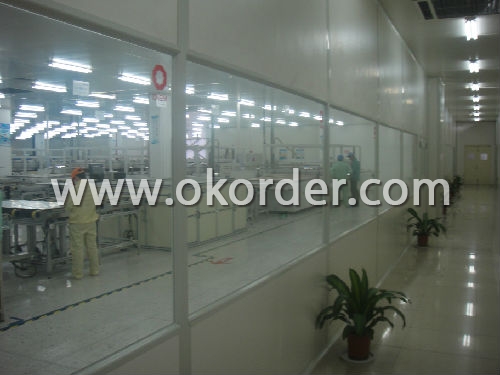
Package Picture of High Quality Solar Controller Tracer-1210RN
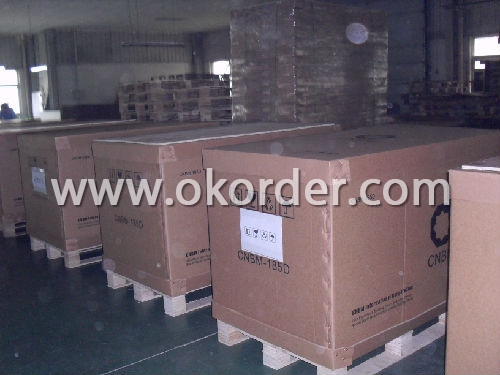
- Q: What are the main components of a solar controller?
- The main components of a solar controller include a charge controller, a battery monitor, and a temperature sensor. The charge controller is responsible for regulating the voltage and current from the solar panels to ensure that the batteries are charged efficiently and safely. It prevents overcharging and over-discharging of the batteries, which can damage them and reduce their lifespan. Modern charge controllers often incorporate maximum power point tracking (MPPT) technology, which optimizes the power output from the solar panels by continuously adjusting the voltage and current to match the batteries' needs. The battery monitor is used to measure and display the state of charge (SOC) and voltage of the batteries. This information is crucial for the user to know the remaining capacity of the batteries and to estimate how long they can power their devices or systems. Some advanced battery monitors also provide additional data such as the battery temperature, which helps in managing the charging process more effectively. The temperature sensor is used to monitor the temperature of the batteries. High temperatures can negatively impact the performance and lifespan of the batteries. The temperature sensor allows the solar controller to adjust the charging parameters based on the battery temperature, ensuring that the batteries are charged optimally and protected from excessive heat. In addition to these main components, some solar controllers may also include features such as LCD displays for easy monitoring, USB ports for charging small electronic devices, and communication ports for data logging or remote monitoring. The components and features of a solar controller can vary depending on the specific model and manufacturer, but the charge controller, battery monitor, and temperature sensor are the fundamental components that ensure the efficient and safe operation of solar systems.
- Q: Solar panels for solar panels
- The use of a single chip and special software to achieve the intelligent control; the use of battery discharge rate characteristics of the correct discharge control. The discharge voltage is controlled by the discharge rate curve of the control point, eliminating the simple voltage control overdosed inaccuracies, consistent with the inherent characteristics of the battery, that is, different discharge rates have different end voltage. With overcharge, over discharge, electronic short circuit, overload protection, unique anti-reverse protection and other automatic control; the above protection does not damage any parts, do not burn insurance;
- Q: Can a solar controller be used with solar-powered security cameras?
- Yes, a solar controller can be used with solar-powered security cameras. A solar controller helps regulate the charging of the batteries connected to the solar panel, ensuring efficient power management for the cameras. It helps prevent overcharging and over-discharging of the batteries, extending their lifespan and ensuring continuous operation of the security cameras.
- Q: How do you determine the right size of solar controller for a system?
- When determining the appropriate size of a solar controller for a system, several important factors must be taken into account. First and foremost, it is necessary to compute the maximum current and voltage that will be produced by the solar panels. This can be achieved by multiplying the panels' maximum current rating by their maximum voltage output. Subsequently, it is essential to establish the maximum current and voltage capacity of the charge controller. This information is typically provided in the manufacturer's product specifications or datasheet. Ideally, the solar controller should have a current and voltage rating that exceeds the maximum values generated by the solar panels. This ensures that the controller can effectively manage and regulate the energy generated by the panels without becoming overwhelmed. Moreover, it is advisable to consider any future expansion plans for the system. If there are intentions to add more solar panels in the future, it is prudent to select a solar controller with a higher capacity than what the current system requires. It is important to highlight that the size of the solar controller should also be compatible with the other components of the system, such as the battery bank and inverter. Consequently, it is crucial to ensure that all components are appropriately matched and compatible with one another. To summarize, determining the appropriate size of a solar controller entails calculating the maximum current and voltage generated by the solar panels, comparing these values with the specifications of the controller, and taking into account any future expansion plans. Consulting a solar professional or referring to manufacturer guidelines is recommended to ensure accurate sizing for your specific system.
- Q: What is the role of a solar controller in preventing damage to the solar panels from power surges?
- The prevention of damage to solar panels from power surges is of utmost importance, and this is where the solar controller comes into play. Referred to as a charge controller as well, it acts as an intermediary between the solar panels and the battery or power grid. Its main objective is to ensure that the energy produced by the panels is stored or used efficiently and securely. One crucial function of the solar controller is safeguarding the solar panels from power surges. These surges occur when there is a sudden surge in voltage, which may be caused by lightning strikes, fluctuations in the power grid, or other external factors. These unforeseen events can have detrimental effects on the delicate electronic components of the solar panels, greatly reducing their lifespan or rendering them completely useless. To prevent damage from power surges, the solar controller effectively manages the flow of electricity from the panels to the battery or grid. It expertly regulates the voltage and current levels, ensuring they remain within safe parameters. When a power surge is detected, the controller acts as a protective barrier, effectively blocking the surge from reaching the vulnerable solar panels. Moreover, many solar controllers are equipped with built-in surge protection devices, including surge arresters or metal oxide varistors (MOVs). These devices are designed to absorb excessive voltage spikes and redirect them away from the panels, providing an extra layer of protection against potential damage. In summary, the role of the solar controller in preventing damage to solar panels from power surges is to maintain control over the flow of electricity and shield the panels from sudden increases in voltage. By acting as a protective barrier and incorporating surge protection devices, the controller ensures the long-lasting performance and optimal functionality of the solar panels, ultimately maximizing the efficiency and effectiveness of the entire solar power system.
- Q: How do I ensure compliance with local regulations when installing a solar controller?
- To ensure compliance with local regulations when installing a solar controller, it is crucial to research and understand the specific requirements and guidelines set forth by your local authorities or governing bodies. This may include obtaining necessary permits, following electrical codes, adhering to zoning restrictions, and complying with any safety standards. It is advisable to consult with a licensed professional or qualified installer who is well-versed in local regulations to ensure a compliant and safe installation process.
- Q: How does a solar controller handle fluctuating solar panel output?
- A solar controller handles fluctuating solar panel output by regulating the amount of energy flowing from the panels to the battery or load. It constantly monitors the voltage and current from the panels and adjusts the charging or discharging process accordingly to maintain a stable and optimal power flow. This ensures that the battery is charged efficiently without overcharging or damaging it, even when the solar panel output varies due to factors like weather conditions or shading.
- Q: Can a solar controller be used with different battery chemistries?
- Yes, a solar controller can be used with different battery chemistries as long as the controller supports the specific requirements and charging profiles of those batteries. It is important to ensure compatibility and adjust the controller settings accordingly to optimize charging efficiency and prolong battery life.
- Q: What is the role of a solar controller in preventing battery undercharging?
- Ensuring the longevity and optimal performance of solar battery systems relies heavily on the crucial role played by a solar controller in preventing battery undercharging. Acting as a mediator between the solar panels and batteries, the solar controller effectively regulates the energy flow and safeguards against undercharging. When electricity is generated by solar panels, it is initially in the form of direct current (DC) and must be converted and controlled before being stored in the batteries. This task is effectively carried out by a solar controller, which continuously monitors the voltage and current levels of both the solar panels and batteries. Among the primary functions of a solar controller is the prevention of battery overcharging, which can cause damage or reduce the batteries' lifespan. However, it is equally important in averting battery undercharging. Undercharging occurs when the batteries do not receive enough charge to reach their full capacity, resulting in diminished performance and a shortened lifespan. To address this issue, the solar controller consistently monitors the battery voltage and adjusts the charging current accordingly. It ensures that the batteries receive an adequate amount of charge to replenish any energy consumed, thereby maintaining them at an optimal state of charge. The solar controller employs a charge algorithm that takes various factors into account, including battery type, ambient temperature, and charging conditions, to determine the appropriate charging current. By adjusting the charging voltage to align with the battery manufacturer's specifications, the solar controller effectively prevents both overcharging and undercharging. Furthermore, solar controllers often incorporate additional features such as temperature compensation and low voltage disconnect (LVD) to further safeguard against battery undercharging. Temperature compensation adjusts the charging voltage based on the ambient temperature, ensuring optimal charging regardless of weather conditions. LVD protects the batteries by disconnecting loads when the voltage falls below a specific threshold, thus preventing excessive discharge and undercharging. In summary, the role of a solar controller in preventing battery undercharging revolves around regulating the energy flow from solar panels to batteries, constantly monitoring voltage and current levels to guarantee a sufficient charge. By preventing undercharging, the solar controller maximizes the performance, lifespan, and overall efficiency of solar battery systems.
- Q: Can a solar controller be used with solar-powered indoor parking facilities?
- Yes, a solar controller can be used with solar-powered indoor parking facilities. A solar controller is a device that regulates the amount of energy flowing from the solar panels to the batteries and prevents overcharging. In the case of indoor parking facilities, solar panels can be installed on the roof or outside the building to generate electricity from the sunlight. The solar controller will then manage the energy produced by the solar panels and ensure that it is efficiently stored in the batteries. This stored energy can then be used to power various systems within the indoor parking facility, such as lighting, ventilation, and security systems. By utilizing a solar controller, solar-powered indoor parking facilities can optimize their energy usage and reduce their reliance on grid electricity, leading to cost savings and a more sustainable operation.
Send your message to us
High Quality Solar Controller Tracer-1210RN
- Loading Port:
- China Main Port
- Payment Terms:
- TT
- Min Order Qty:
- 1 unit unit
- Supply Capability:
- 10000 unit per month unit/month
OKorder Service Pledge
OKorder Financial Service
Similar products
Hot products
Hot Searches
Related keywords
